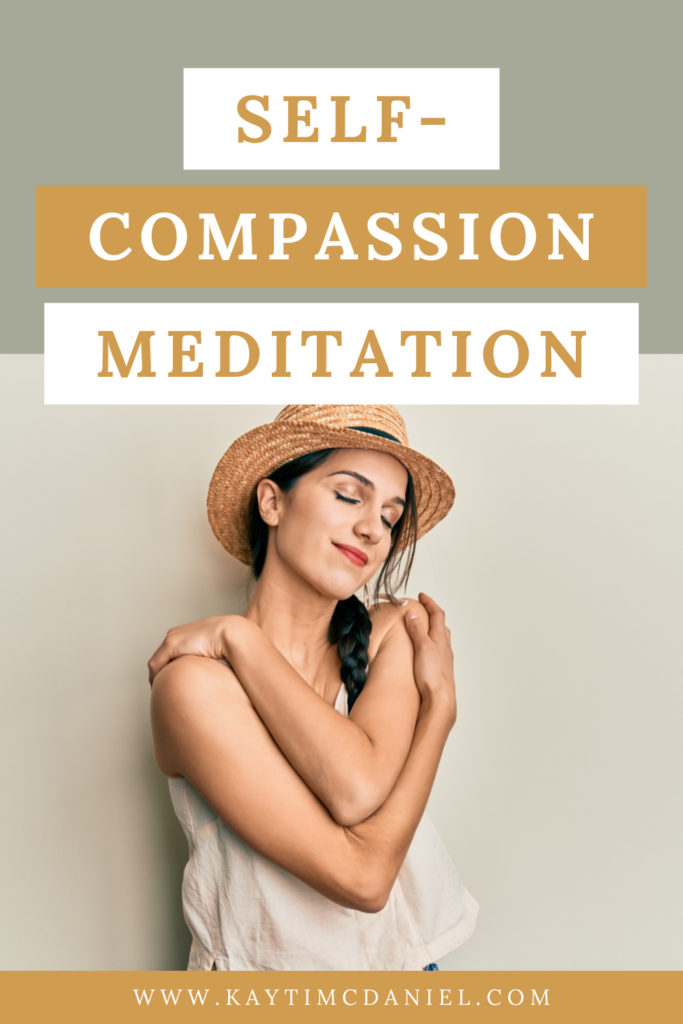
How do you treat yourself?
When life and parenthood feel hard, how do you treat yourself? You may not realize it, but you have some options. One option is to judge, blame, and criticize yourself. But, this usually makes things harder. Another option is to treat yourself in the way you’d treat someone you really care about when they’re having a hard time. Hopefully — this is with kindness and care and support. In this post, I share a self-compassion meditation to help you do just that.
Here’s a self-compassion meditation for new parents.
First, go ahead and settle in. Find a spot where you’re comfortable hanging out for a bit. If you’re comfortable, gently close your eyes. Or, if you’d rather, find something around you to focus on. Take a nice deep breath.
Now I want you to think about your experience of parenthood so far. Take a second to think about what you’ve been through to get to today. Think about how this experience is impacting you — your body, your mood, your routine, your relationships, and your sense of self. Imagine how becoming a parent will affect you for the next year, the next five years, the next eighteen years, and all the years after.
As you think about how becoming a parent has impacted you so far and imagine how it will impact you into the future, notice any strong emotions that show up. If you can, quietly greet those emotions, the way you’d greet a friend. This could sound like “hey grief” or “hi anxiety.”
Notice where you feel those emotions in your body. Slowly scan from the top of your head all the way down to your toes, noticing any physical sensations. Pay attention to any discomfort or pain. Also pay attention to anything that feels good. Practice being curious about these sensations — what’s it like to be feeling this in your body right now?
Now bring your hands together — palm to palm. Remember some of the moments that you’ve used these hands in kind ways. Maybe you’ve held your partner’s hand or given them a big, long hug when they were having a hard day. Maybe you’ve held, cuddled, and rocked your crying baby to soothe them to sleep. Imagine filling your hands with all of the caring, warm, supportive energy that they had in those moments.
Next, use those hands to offer your body kindness and comfort. If it feels too scary to touch your body right now, for whatever reason, that’s okay — you might offer your body kindness and comfort just by imagining that caring, warm, supportive energy radiating from your hands throughout your entire body. If it’s comfortable for you, consider wrapping your hands and arms around yourself in a big hug. Or, gently place them where your body is feeling the most pain or discomfort. Or, just rest one hand over your heart and one on your belly.
Wherever you’ve chosen, take a beat to let your hands rest there. Keep imagining that caring, warm, supportive energy flowing from your hands into your body. As it moves through your body, it may find pain or discomfort. When it does, imagine the energy helping your body to soften around it and make more space for it to just be there. Imagine holding your pain or discomfort with love — as if it were your partner after that long day or your crying baby. When there is no pain or discomfort, just focus on receiving a sense of care, warmth, and support.
And as you continue resting there, remind yourself that becoming a parent feels hard because it is hard. If you’re experiencing emotional pain and discomfort in response to this hard thing, remind yourself that you make sense. This isn’t a sign that something is wrong with you — it’s evidence of your humanness. And remind yourself that right here, right now there are new parents all over the planet who are experiencing their humanness too.
Feel free to pause and stay here as long as you like.
Notice what it’s like to send this love to yourself and what it’s like to receive it. Consider thanking yourself for trying this self-compassion meditation. When you’re ready, take another deep breath, open your eyes if they’re closed, and bring your attention back to the room.
Self-compassion takes practice.
If self-compassion isn’t your default setting, the first thing I want you to know is that you’re in good company. This isn’t always something we’re taught or something we’ve had modeled to us. It’s hard to be what we can’t see. But the second thing I want you to know is that self-compassion is like a muscle that you can build over time. Every time you show up for yourself with kindness and care and support , you’re strengthening that self-compassion muscle. Eventually, you’ll be much stronger for it.